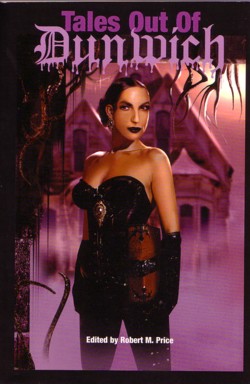Tales Out of Dunwich
edited by Robert Price
Originally for the Samhain, 2005 mailing of the Esoteric Order of Dagon (#132)
 -->
-->What separates this collection from the many others that are coming (and even mine) is that Robert price has managed to dig up a copy of Harper Williams's very difficult-to-find novel The Thing in the Woods, mentioned by Lovecraft as being influential on "Dunwich Horror" and yet not as often seen as the better-known Arthur Machen's "The Great God Pan." In providing this story to us, Price and Hippocampus have given great service, for among other things, Williams's novel establishes why Lovecraft was so unsatisfied with the weird tales of his day, and interestingly, this is precisely the fate that has befallen the vast majority of Lovecraft's imitators and pasticheurs. We know that the concept is frightening–after all it frightened us the first time around–and so there is little effort to build up atmosphere, because the author knows that they are leading up to a well-known horror trope. And if, as Lovecraft asserted, the oldest and strongest of fears if fear of the unknown, then these known horrors lose much of their power, becoming merely predators of men like tigers or sharks.
What makes Lovecraft's "Dunwich Horror" unique and powerful is the fact that even after the titular horror has been seen, the reader continues to scratch his head and ask, like Steve Martin in a Saturday Night Live sketch, "What the Hell is that?" For while The Thing in the Woods effectively builds up its atmosphere, once the author gives us a hint as to what said Thing is, the tension is lost, and it becomes another conventional story about another well-known horror staple. We know what it is, we know how it can be defeated, we know what rules govern its life.
The rest of the book is filled with an assortment of authors playing in Lovecraft's sandbox. It is particularly interesting to read such tales from various people and seeing what Dunwich means to them. How many of the authors utilize Lovecraft's themes of miscegenation and the madness in rural life, and how many use it simply as a backdrop in which to tell their own stories? It's an interesting question, and one that is answered with varying degrees of success.
What Gerald Goannattasio's "The N-Scale Horror" is doing in this collection I'm not sure. It's certainly related to Dunwich, but it's on the silly side without actually being funny. As a story, I was rather unimpressed. Fortunately, this was really the only klunker in the lot. Brian McNaughton's "The Dunwich Lodger" is a wonderful story, full of the creepy horribleness that I like to read in a Lovecraftian collection. Mr. McNaughton managed to hit many of the themes of "Dunwich Horror" from sex to the degeneracy of rural folk, making his story more of an homage than many of the other peices in the anthology, which plant their stories in Lovecraft's landscape without expressing much understanding of the underlying themes of the work they pastiche. Others, such as Robert Price's "Acute Spiritual Fear" which doesn't manage to convey the emotional impact that it could, or Richard Lupoff's "The Doom that Came to Dunwich" strike out almost entirely on their own, owing very little to Lovecraft's original ideas except as a location for the story to happen. This does not make them bad stories, or even inappropriate for the collection, rather these are cases of words revealing more about the utterer than they do the subject. They are competently written, and if they do not pack much in the way of emotional punch, they are not difficult to read. Eddy Bertin's "Dunwich Dreams, Dunwich Screams" is an enjoyable and memorable cap to the anthology, partially because it takes Dunwich out of the New England backwoods, and uses English Dunwich, the town that fell into the sea.
What makes this book more than just another collection of Mythos pastiches and more of interest to the Lovecraft scholar is the inclusion of the hard-to-find The Thing in the Woods. This is a valuable find, and anyone who wants to understand Lovecraft's influences on ‘The Dunwich Horror" owes it to themselves to pick this up.